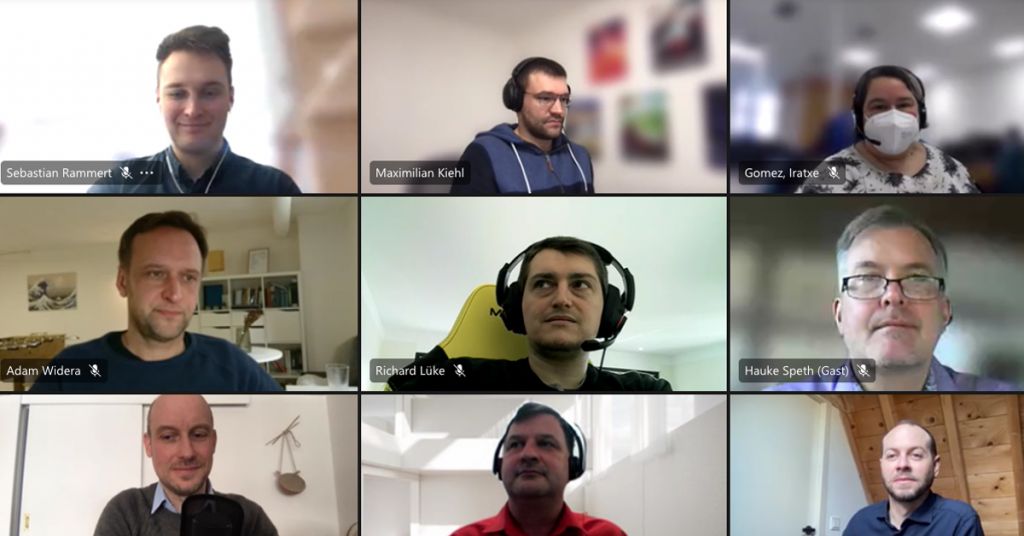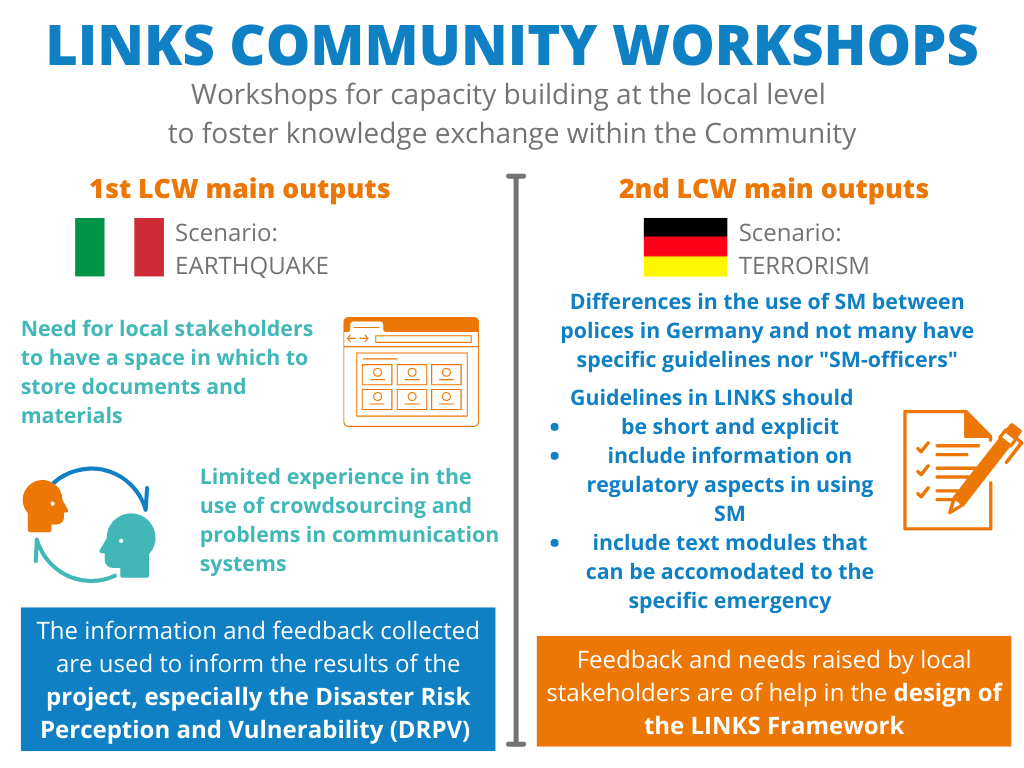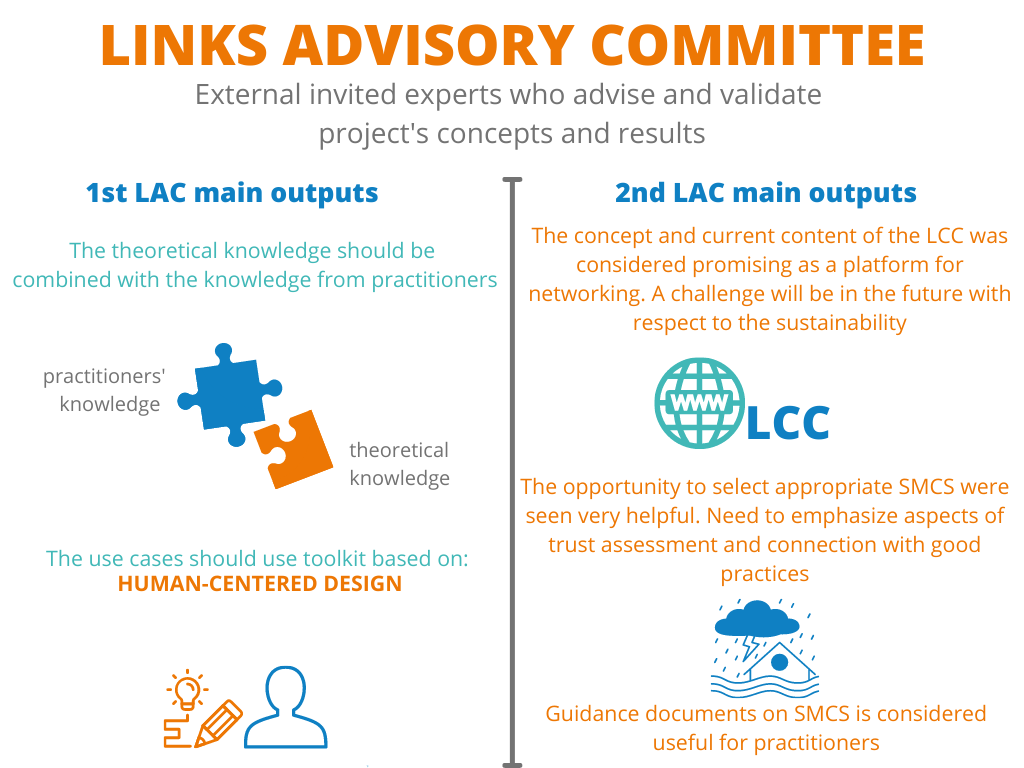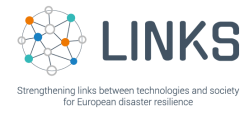
From January 2021 to February 2022 two important activities of the project have taken place: the LINKS Community Workshops (LCWs) which are one of the main tools through which the LINKS Community engages with the project partners and the LINKS Advisory Committee (LAC) which consists of external invited experts from different organizations who advise and validate project’s concepts and results.
These two activities occurred in various remote meetings which are detailed in this article to show the outcomes.
In particular, the LCWs can be considered as a means to foster knowledge exchange within the Community, which is in turn critical to the success of the project and to ensuring that project’s partners are provided with valuable feedback and resources. Concretely, the LCWs are workshops for capacity-building at the local level. They are held in each of the four pre-defined case countries and linked to the five pre-defined case scenarios (earthquake in Italy, industrial disasters in the Netherlands, drought in Germany, flooding in Denmark and terrorism in Germany) to leverage the contextualized knowledge of the Community and apply it to the development and evaluation of the LINKS results.
The first LCW took place in Terni, Italy in November 2021, and it was linked to the earthquake scenario. The workshop was attended by 35 participants, including Italian consortium partners and local stakeholders involved in the Civil Protection system of the Umbria region. The aim of the first LCW was twofold: one the one side, it aimed to introduce the LINKS project and the Italian case to local stakeholders; on the other side, it aimed to gain a deeper understanding of local stakeholders’ experiences and needs about the use of Social Media and Crowdsourcing (SMCS) in disasters.
As a result, the first LCW has been crucial to highlight the following main results: the workshop has brought out the need for local stakeholders to have a space (e.g. website or a social media page) in which to store documents and materials to share with people and to receive indications on how to better improve the use of social media. Also, it has been identified a limited experience in the use of crowdsourcing as well as problems in the communication systems (e.g. worries about the use of social media to collect information provided by affected citizens).
At the broadest level, the information and feedback collected will be used to inform the results of the project, particularly the Disaster Risk Perception and Vulnerability (DRPV) tool and the DRPV knowledge base.
The second LCW was held virtually in February 2022 and was linked to the terrorism scenario.
The workshop was attended by 7 participants, including representatives from the project’s partner DHPol and local stakeholders involved in the German police. The workshop aimed to gain deeper insights into the use of SMCS within the German police, into the needs of practitioners regarding SMCS as well as into the participants’ expectations from the guidelines designed by the project and included in the LINKS Framework.
The main outcomes that emerged are the presence of differences in the use of SM between the polices in Germany (e.g. some use only Twitter while other use different SM and not many have specific guidelines nor specific “SM-officers”) and it has been observed that the guidelines developed in LINKS should include some essential characteristics: they should be short and explicit (e.g. checklist), they should include information on regulatory aspects for the use of SMCS and if possible, they should provide text modules which can be accommodated to the specific emergency.
The feedback and needs raised by local stakeholders, particularly regarding their expectations from the guidelines developed in the project, will be of help in the design of the LINKS Framework.
Additional LCWs will be conducted during the project; the related reports will be available later this year.

Concerning the LAC, the first meeting was held virtually in January 2021. By and large, the meeting aimed at receiving external feedback on the development of the scientific and conceptual foundations for the research and the design thinking for key project results (e.g. the learning components of the LINKS Framework). Focusing on results, this meeting showed the need from the theoretical knowledge to be combined with the knowledge from the practitioners on the basis of a co-design approach while for the development of the use cases, which are meant to evaluate the LINKS Framework, one should use human centered design toolkit (e.g. storyboard method, role playing, rapid prototyping, models and mock-ups).
The second LAC meeting was held virtually in February 2022 and was attended by 10 invited experts and project’s consortium partners. The meeting aimed to receive external feedback about the concept and content of the LINKS Community Center (LCC), specifically in relation to libraries of Disaster Community Technologies (DCTs), SMCS Guidelines, and Stakeholder Networks.
As a result, the main outcomes emerged that the concept and current content of the LCC was considered promising as a platform for networking. A challenge will be in the future, with respect to the sustainability. Furthermore, the opportunities to select appropriate DCTs were seen as very helpful, and some new advice was given to refine the current status (aspects of trust assessment and connections to good practices were emphasized). In conclusion, guidance documents on SMCS were considered useful, especially for practitioners as long as they are presented in a user-friendly way in which concise and straightforward versions should be given priority.

To know more, read our deliverables:

